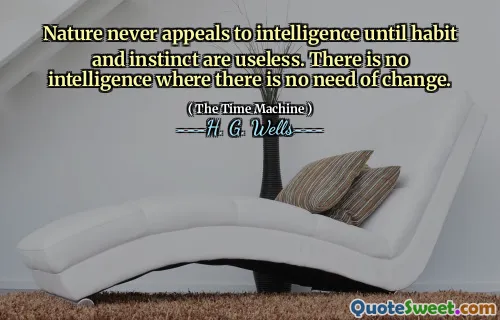
Don't follow you,' said Filby.
In H.G. Wells' "The Time Machine," there is a notable exchange where a character named Filby expresses his skepticism about following the Time Traveler's ideas. His statement, "Don't follow you," reflects a broader theme of disbelief and caution towards revolutionary concepts that challenge conventional understanding. This moment highlights the tension between exploration and skepticism, illustrating how new ideas can provoke doubt among those unwilling to embrace change. The interaction between Filby and the Time Traveler emphasizes differing perspectives on progress and the unknown. Filby’s refusal to follow indicates a fear of the implications behind time travel, a recurring theme in the novel. This divide serves as a commentary on human nature's resistance to innovation and the uncertainties that accompany it, ultimately inviting readers to consider their own responses to the unknown and the potential consequences of seeking knowledge beyond familiar boundaries.
In H.G. Wells' "The Time Machine," there is a notable exchange where a character named Filby expresses his skepticism about following the Time Traveler's ideas. His statement, "Don't follow you," reflects a broader theme of disbelief and caution towards revolutionary concepts that challenge conventional understanding. This moment highlights the tension between exploration and skepticism, illustrating how new ideas can provoke doubt among those unwilling to embrace change.
The interaction between Filby and the Time Traveler emphasizes differing perspectives on progress and the unknown. Filby’s refusal to follow indicates a fear of the implications behind time travel, a recurring theme in the novel. This divide serves as a commentary on human nature's resistance to innovation and the uncertainties that accompany it, ultimately inviting readers to consider their own responses to the unknown and the potential consequences of seeking knowledge beyond familiar boundaries.











